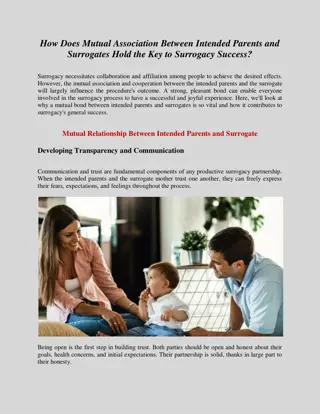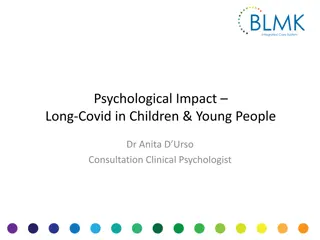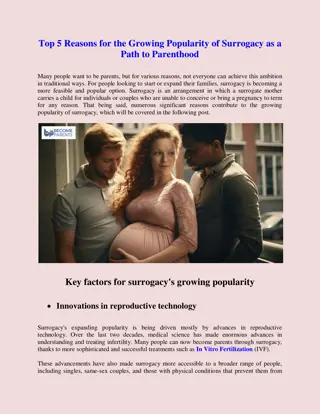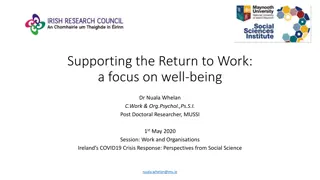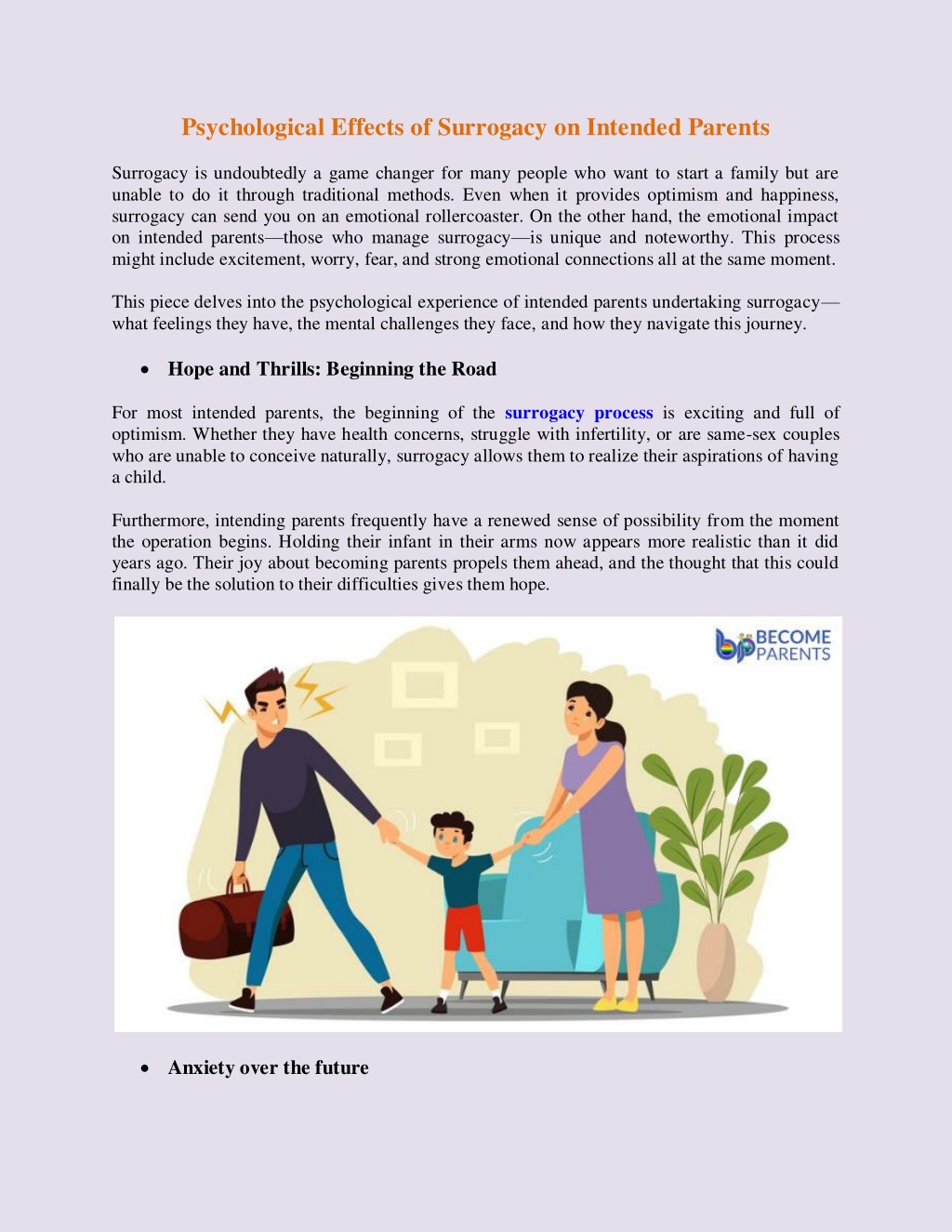
Psychological Effects of Surrogacy on Intended Parents
Intended parents will feel a wide range of emotions during their surrogacy journey, including hope, worry, happiness, and everything in between. So read this PDF, to know and learn the psychological effects of surrogacy on intended parents.
Download Presentation

Please find below an Image/Link to download the presentation.
The content on the website is provided AS IS for your information and personal use only. It may not be sold, licensed, or shared on other websites without obtaining consent from the author. Download presentation by click this link. If you encounter any issues during the download, it is possible that the publisher has removed the file from their server.
E N D
Presentation Transcript
Psychological Effects of Surrogacy on Intended Parents Surrogacy is undoubtedly a game changer for many people who want to start a family but are unable to do it through traditional methods. Even when it provides optimism and happiness, surrogacy can send you on an emotional rollercoaster. On the other hand, the emotional impact on intended parents those who manage surrogacy is unique and noteworthy. This process might include excitement, worry, fear, and strong emotional connections all at the same moment. This piece delves into the psychological experience of intended parents undertaking surrogacy what feelings they have, the mental challenges they face, and how they navigate this journey. Hope and Thrills: Beginning the Road For most intended parents, the beginning of the surrogacy process is exciting and full of optimism. Whether they have health concerns, struggle with infertility, or are same-sex couples who are unable to conceive naturally, surrogacy allows them to realize their aspirations of having a child. Furthermore, intending parents frequently have a renewed sense of possibility from the moment the operation begins. Holding their infant in their arms now appears more realistic than it did years ago. Their joy about becoming parents propels them ahead, and the thought that this could finally be the solution to their difficulties gives them hope. Anxiety over the future
Despite their excitement, intending parents may have anxiety over the unknown, the surrogacy procedure, or things going wrong. Finding the perfect surrogate, ensuring legal precautions, managing funds, and, most importantly, praying for a successful pregnancy are all part of the surrogacy process. Because intended parents have little influence over the pregnancy, they may be apprehensive about whether the surrogate will have a smooth experience or if complications would arise. This sense of powerlessness might be especially concerning for those who have already had failed reproductive therapies or miscarriages. Although experts oversee the surgery, expectant parents are understandably concerned about the outcome. Relationship Building and Trust with the Surrogate Developing trust with the surrogate is one of the most essential emotional obstacles in surrogacy. Initially, this can be tough for the intended parents. After all, they rely heavily on someone else to bear their child. This method necessitates a high degree of emotional transparency. A successful surrogacy journey is dependent on the intended parents establishing a relationship with the surrogate. Geographical distance, cultural differences, or simply the embarrassment of relying on someone else to bring their child into the world can all exacerbate the relationship. Some intended parents are concerned that their relationship will appear transactional, or that they will not get along with the surrogate. Many people, however, find that their initial concern gives way to gratitude and a special, maybe lifelong relationship with the surrogate. Experiencing Pregnancy as an Outsider The sense of being cut off from the pregnancy is a common psychological barrier for prospective parents. They may feel excluded from important events such as the baby's first movement or scheduled ultrasounds because they aren't physically carrying the child. Despite their emotional engagement, intending parents may nevertheless feel isolated from their actual pregnancy experience. This can be especially tough for women who are unable to carry a pregnancy due to medical or personal reasons. Despite their strong desire to become mothers, many surrogate mother struggle with feelings of shame, loss, or frustration at their inability to experience pregnancy firsthand. Male same-sex couples may experience similar emotions, but they may additionally suffer social pressure regarding traditional gender roles and parenting responsibilities. Controlling Emotional Highs and Lows Surrogacy is rarely a smooth journey from beginning to end. From the initial excitement of choosing a surrogate to the anxiety of legal paperwork, medical procedures, and waiting for the pregnancy to grow, there are many emotional highs and lows.
One minute, intended parents are pleased; the next, they may experience emotional whiplash and become anxious about difficulties. However, if you're worried about your future family, nine months may feel like a lifetime. One also fears about miscarriage, which, while rare, does occur. Sometimes parents have "survivor's guilt" if their surrogacy journey goes smoothly while others are still in crisis. Final words Intended parents will feel a wide range of emotions during their surrogacy journey, including hope, worry, happiness, and everything in between. Though the psychological damage may be significant, the ultimate benefit of holding a much-anticipated child in their arms makes it all worthwhile. Intended parents can navigate the ups and downs of surrogacy and emerge with a strong sense of love and fulfillment by acknowledging and resolving their emotions, seeking assistance, and developing close connections with their surrogates. Ultimately, even if surrogacy offers obstacles, it is a path that leads to the evolution of families a journey that is emotionally complex but rewarding.










